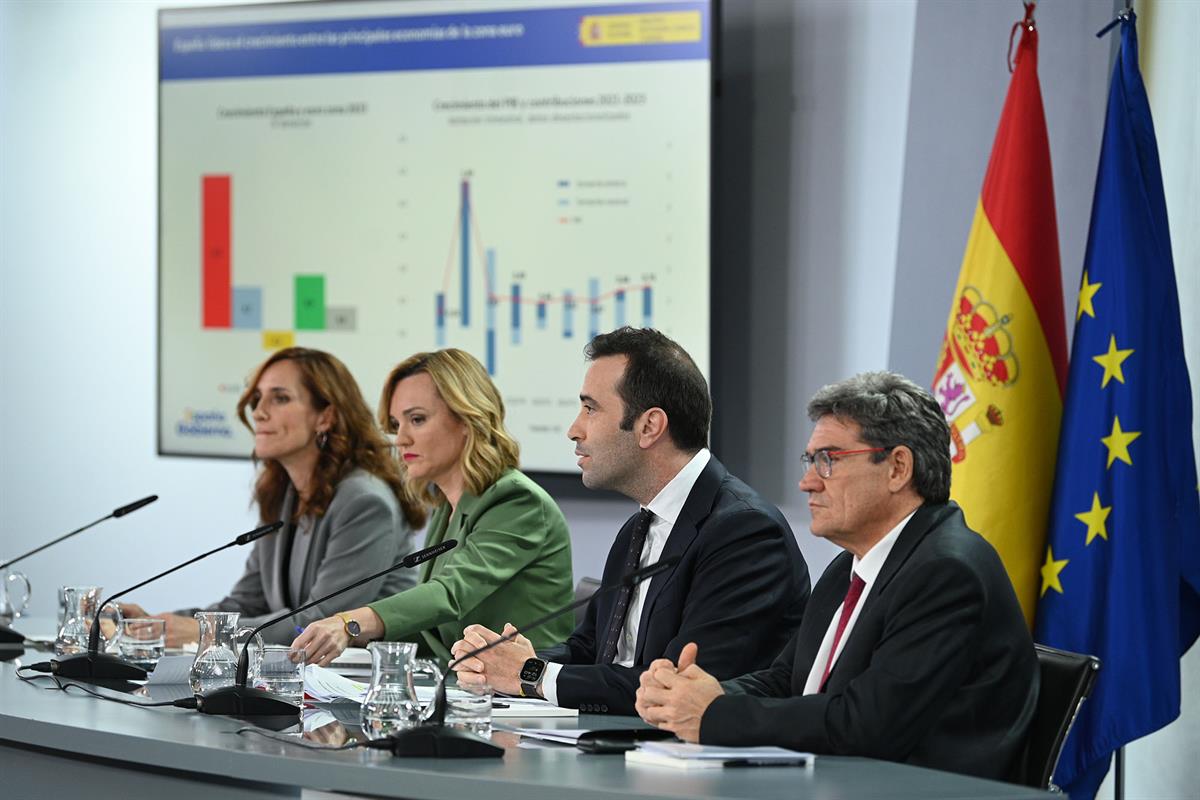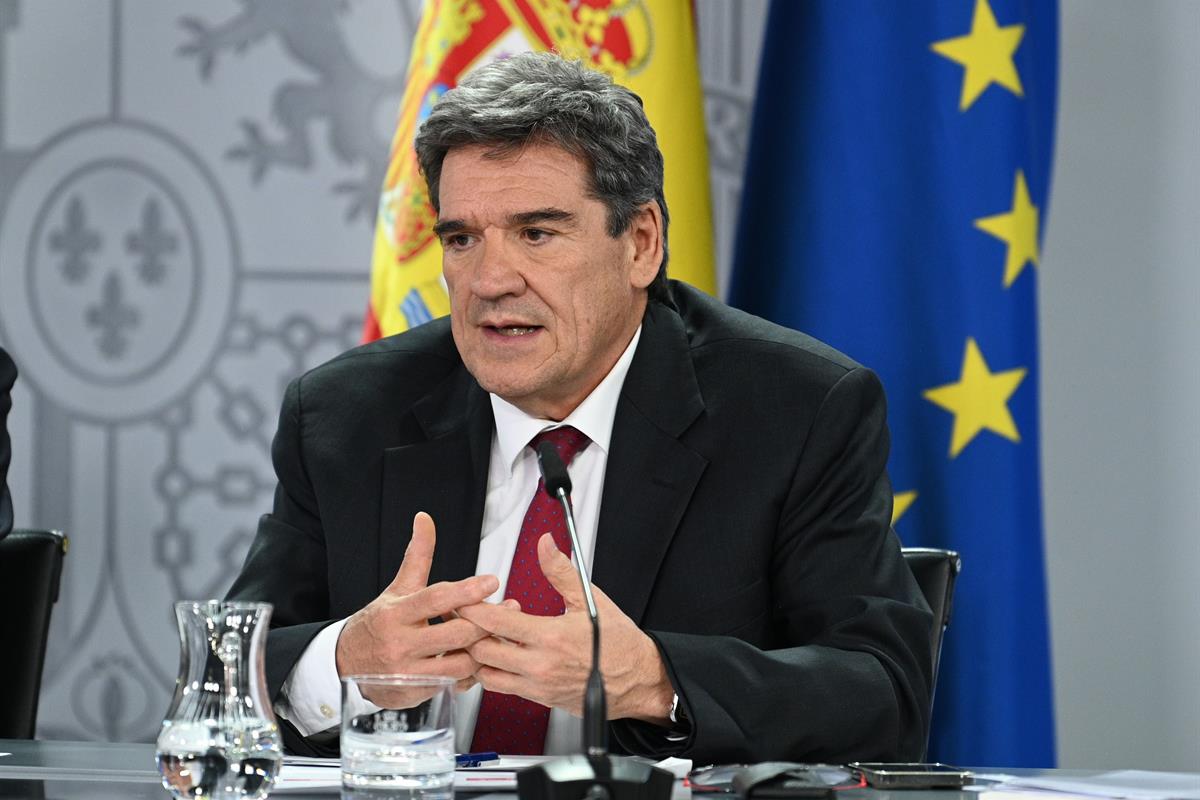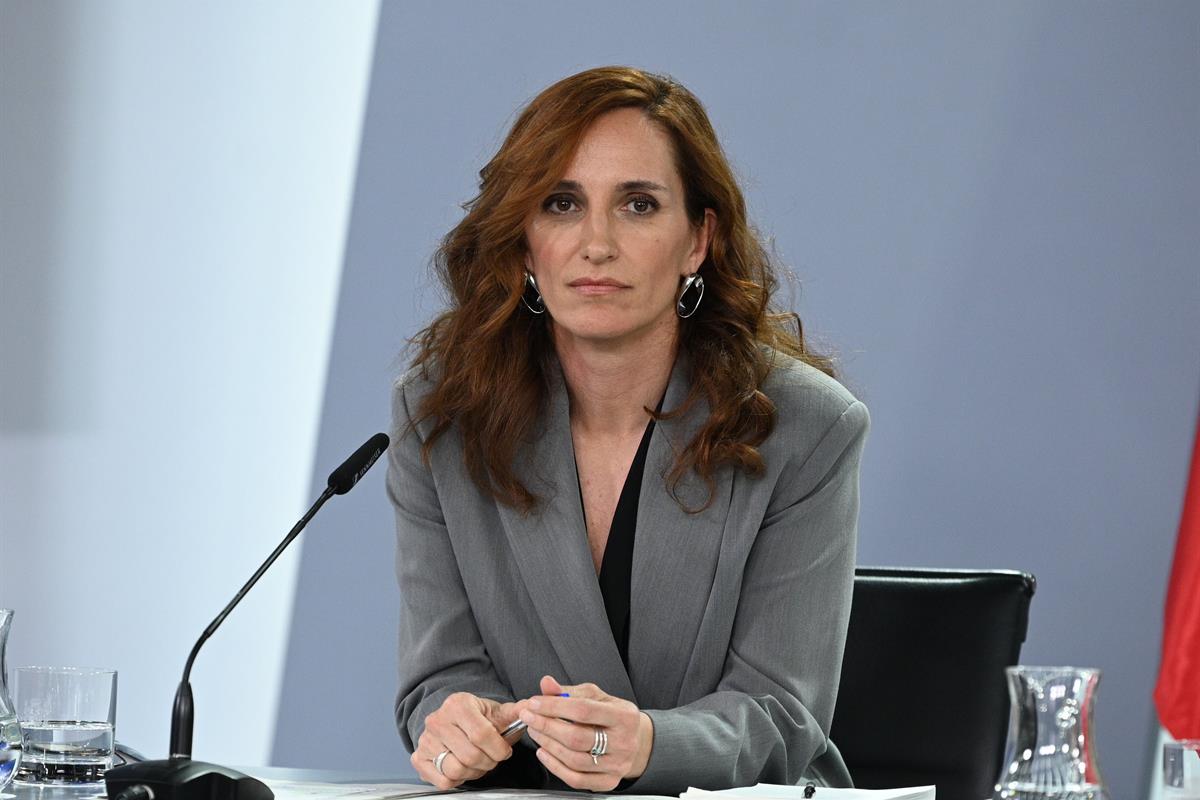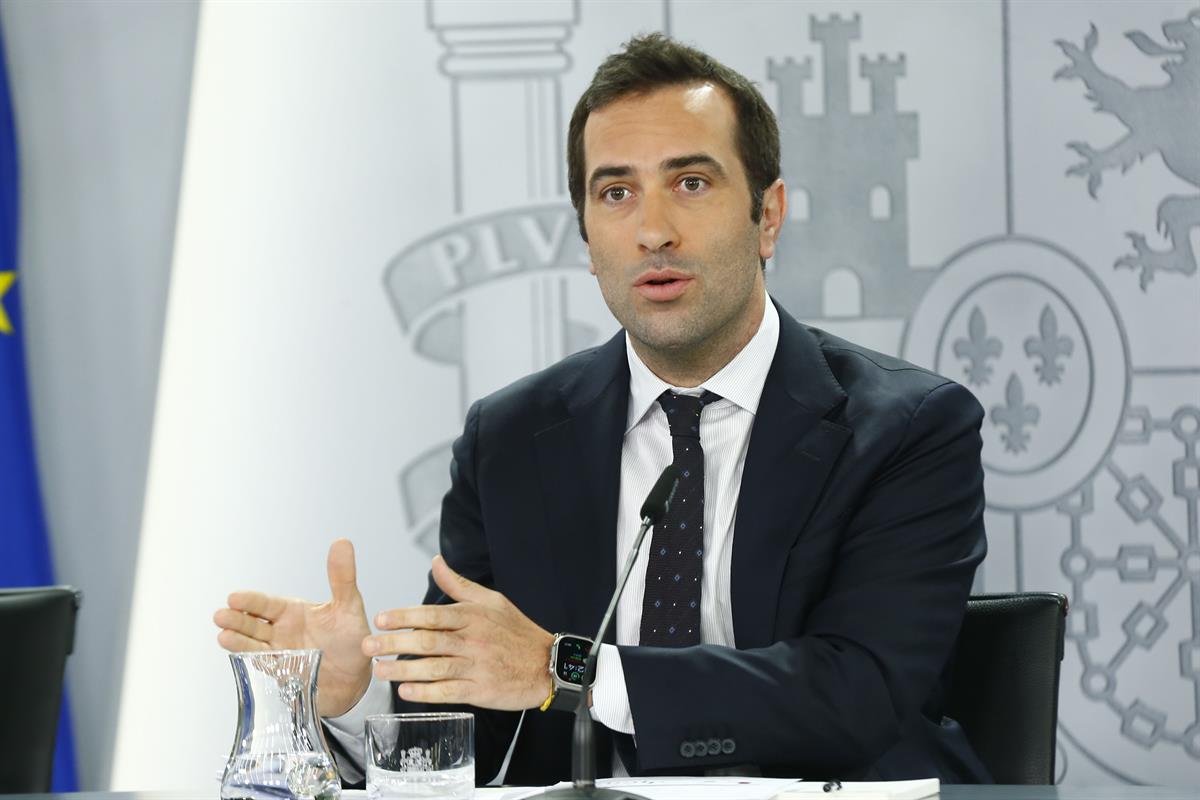Council of Ministers
The Government of Spain approves the Artificial Intelligence Strategy 2024
Council of Ministers - 2024.5.14
Moncloa Palace, Madrid
 The ministers Mónica García, Pilar Alegría, Carlos Cuerpo and José Luis Escrivá, during the press conference after the Council of Ministers (Pool Moncloa/Borja Puig de la Bellacasa)
The ministers Mónica García, Pilar Alegría, Carlos Cuerpo and José Luis Escrivá, during the press conference after the Council of Ministers (Pool Moncloa/Borja Puig de la Bellacasa)
The Council of Ministers has approved the Artificial Intelligence (AI) Strategy 2024, which gives continuity to the initiatives deployed by the Government in this area and adapts them to the changes experienced by this technology in recent years.
The Minister for Digital Transformation and Civil Service, José Luis Escrivá, has stressed that artificial intelligence will be key to the development of the economy and public administration, which is why the Government wants to consolidate and promote its use from an ethical, humanistic and transparent perspective.
The strategy will be deployed in 2024 and 2025, and is earmarked with €1.5 billion from the Recovery, Transformation and Resilience Plan and its addendum, to be added to the €600 million already mobilised.
José Luis Escrivá explained that included in the strategy is the strengthening of supercomputing. In his opinion, Spain is well prepared because it has one of the world's most powerful computers, the MareNostrum, which will receive an investment of €90 million to improve its performance in the field of artificial intelligence and facilitate its access to industry. The Spanish Supercomputing Network will also be strengthened.
The document foresees the establishment of sustainable digital infrastructures. According to the minister, artificial intelligence models require many data centres, which will have to comply with environmental standards and be territorially organised. In the area of sustainability, the Government will also deploy European funds to provide loans and capital to companies that help innovate in the field of artificial intelligence by reducing energy and water consumption.
Artificial intelligence language models
 The Minister for Digital Transformation and Civil Service, José Luis Escrivá, during the press conference after the Council of Ministers | Pool Moncloa /Borja Puig de la Bellacasa
The Minister for Digital Transformation and Civil Service, José Luis Escrivá, during the press conference after the Council of Ministers | Pool Moncloa /Borja Puig de la Bellacasa
The strategy includes the creation of language models in Spanish and co-official languages to be called ALIA, which will be available after the summer. The minister stressed that the Executive's decision to have its own model in this first stage of the development of artificial intelligence has a dual motive: to ensure that the foundational models have a sufficiently large component of Spanish and the co-official languages, and that this data documentation component is developed with high standards of transparency and openness.
Escrivá pointed out that these conditions are not present in the available models, which is why a model needs to be promoted from the public sphere, the intention of which is not the replacement of the existing ones, but the reduction of biases and improved practical applications that can be developed by companies and administrations in our country.
The minister also stressed that the strategy will boost talent specialised in artificial intelligence through the creation of research areas and the search for synergies among the projects already underway, which involve an investment of €600 million. An additional €160 million will be invested in scholarships and specialised training in the field with the aim of ensuring that Spain has specialists in the field.
Regarding the use of artificial intelligence in public administrations, José Luis Escrivá pointed out that this is the area where there are the best conditions for developing pilot projects, testing their potential and controlling risks. A common data governance model and corpus of the General State Administration will also be developed to guarantee the security, quality, interoperability and reuse of data.
To promote the development of AI in the private sector, especially in SMEs and among the self-employed, the strategy includes the development of the Kit Consulting programme, aimed at providing guidance. The minister also recalled that the calls for the Digital Kit programme have been reinforced with the incorporation of new artificial intelligence products, the number of recipients of which has been expanded.
José Luis Escrivá stressed that security elements must be strengthened to avoid potential misuse of AI. The future Cybersecurity Law will establish a clear framework and improve the protection of information systems, networks and data.
Last, the strategy promotes transparent, ethical and humanistic AI, as set out in the European Regulation on the subject promoted during the Spanish presidency of the EU. According to the minister, the Spanish Agency for the Supervision of Artificial Intelligence (AESIA) plays a key role in the dissemination and education of AI, its uses and risks.
"We have to decide where we draw the line. Certain decisions must be taken by humans and not by machines," concluded the minister, who urged Parliament to reach a consensus on measures in this area.
Takeover of Vodafone Spain by Zegona
The Government has authorised Zegona Bidco's purchase of Vodafone Spain, according to the Minister for Digital Transformation and Civil Service.
The deal, which involves the purchase of the third largest telecommunications operator in Spain in terms of market share, is valued at €5 billion. The acquiring group has committed to guarantee continuity of service and envisages future investments, mainly in mobile coverage with 5G technology.
Draft Universality Bill
 The Minister for Health, Mónica García, during the press conference after the Council of Ministers | Pool Moncloa / Borja Puig de la Bellacasa
The Minister for Health, Mónica García, during the press conference after the Council of Ministers | Pool Moncloa / Borja Puig de la Bellacasa
The Minister for Health, Mónica García, has reported on the approval by the Council of Ministers of the Draft Law on the Universality of the National Health System. The bill will protect the right to health care under equal conditions for all Spanish people living abroad, foreigners who come here for family reunification and for all people residing in Spain, regardless of their administrative status.
The text of this legislative proposal thereby extends the right to health care to relatives in the ascending line who are reunited with the eligible son or daughter when they are dependent on them, and to Spaniards of origin and their family members living abroad when they move temporarily to Spanish territory. Furthermore, as the Minister for Health explained, this regulation recovers the single common portfolio of services and establishes the necessary guarantees so that no new co-payments can be included.
"I think this is one of the lessons we learned during the pandemic," García said, "when it was said that no one is safe until everyone is safe. This law materialises that lesson by guaranteeing the right to health," she concluded.
€38.5 million to improve mental health
The Minister for Health also reported on the authorisation of the transfer of €38.5 million in funds to the autonomous communities and cities, in the framework of the Mental Health Strategy 2022-2026.
According to Mónica García, this allocation "strengthens the Government's commitment" to this issue, giving continuity to the funds already distributed in 2022 and 2023 within the Mental Health Action Plan 2022-2024, the tool used to comply with the Mental Health Strategy.
Following the authorisation of the distribution of these funds in the Council of Ministers, the next step will be the approval of this transfer to the communities in the Interterritorial Council of the National Health System.
Report on the current economic situation and future prospects
 The Minister for Economy, Trade and Enterprise, Carlos Cuerpo, during the press conference after the Council of Ministers | Pool Moncloa / Jose Manuel Álvarez
The Minister for Economy, Trade and Enterprise, Carlos Cuerpo, during the press conference after the Council of Ministers | Pool Moncloa / Jose Manuel Álvarez
The Minister for Economy, Trade and Enterprise, Carlos Cuerpo, has presented to the Council of Ministers a report on the situation of the Spanish economy, with updated forecasts for 2024 and 2025.
The data show that the economy presents "a balanced, robust and differential growth pattern with respect to the main European partners, also showing to be compatible with price moderation, with the strength of the foreign sector and with fiscal responsibility, all on the basis of a strong and robust labour market", said the minister.
Carlos Cuerpo detailed that in 2023 Spain grew five times more than the main economies of the Eurozone and, according to the forecasts of all international institutions, it will continue to lead growth and the post-pandemic recovery in 2024 and 2025. Moreover, analysts and international organisations are revising upwards their growth forecasts for Spain in 2024, drawing closer to the government's forecast of 2%.
The minister argued that labour market developments are underpinning the good growth pattern. More than 230,000 new registrations have already been created in 2024 in seasonally adjusted terms, and 3.5 million more permanent contracts have been signed since the start of the labour reform. Moreover, almost four out of every ten jobs created in the EU were created in Spain and in sectors with higher added value, such as IT, R&D&I or scientific activities.
Growth is also showing to be compatible with a progressive moderation of prices, according to Cuerpo. Inflation is around 3%, while the Bank of Spain's forecast is 2%, which is the European Central Bank's target for 2025. Wage and non-wage income developments has also contributed to the recovery of households' purchasing power, together with price moderation. Spain is ahead of its main European partners in terms of the recovery of purchasing power.
Carlos Cuerpo also reported that balanced growth is supported by a dynamic external sector, to which the tourism sector has contributed, as have capital inflows resulting from investor confidence in the economic model. In fact, Spain ranks fourth in the world in terms of the number of new projects financed with foreign direct investment.
Furthermore, the minister predicted that the public deficit will reach 3% of GDP by the end of 2024, and 2.5% in 2025. For its part, public debt is expected to fall by more than 20 percentage points to around 104% by 2025 to reach the target of 100% by the end of the legislature.
Implementation of the Recovery Plan
The Minister for Economy underlined the contribution of the Recovery, Transformation and Resilience Plan to the balanced growth of the Spanish economy. The minister said that of the first €70 billion in transfers allocated to Spain, more than €35 billion have already reached companies and households.
The minister indicated that during the second phase of the Recovery Plan, the more than €83 billion allocated in loans through different financial funds will be assigned, adding that in the coming weeks an agreement will be reached with the European Investment Bank to channel a further €20 billion through the Autonomous Resilience Fund. This envelope will be used to finance strategic projects in sustainable mobility and tourism, industrial competitiveness and housing rehabilitation, among others.
Non official translation







